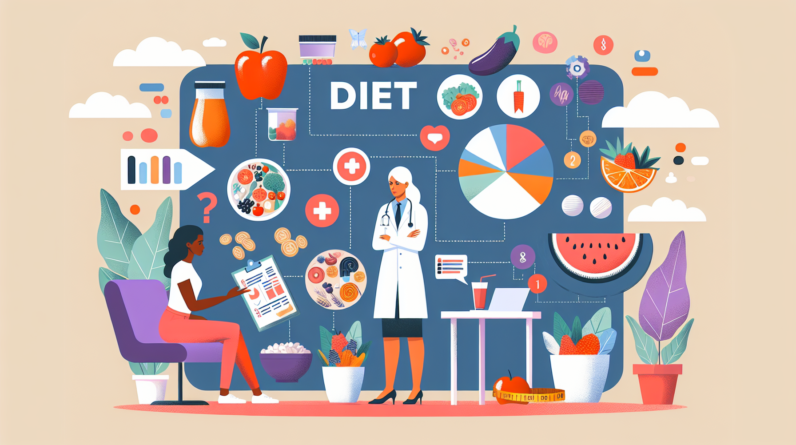
Maintaining a balanced diet is a key component in achieving optimal health and fitness. As we explore the science behind a balanced diet, we delve into the importance of fueling our bodies with the right nutrients and the potential benefits it can bring. By understanding the intricate relationship between food and our bodies, we can make informed choices that not only nourish us but also contribute to our overall well-being. In this article, we aim to shed light on the science behind a balanced diet, unraveling the mysteries of nutrition and empowering individuals to take control of their health.
The Importance of a Balanced Diet
A balanced diet plays a crucial role in maintaining our overall health and well-being. By understanding the basics of a balanced diet and its impact on our bodies, we can make informed choices about our dietary habits. However, there are common misconceptions regarding what constitutes a balanced diet. In this article, we will explore the significance of macronutrients and micronutrients, the role of caloric intake and energy balance, the importance of different food groups such as carbohydrates, proteins, fats, and fiber, and the essential role of vitamins, minerals, and hydration in maintaining a healthy lifestyle.
Understanding the Basics of a Balanced Diet
A balanced diet refers to consuming a wide variety of foods from different food groups in appropriate proportions. It involves obtaining the right amount of macronutrients, such as carbohydrates, proteins, and fats, and an adequate intake of micronutrients, including vitamins and minerals. Balancing our diet provides our bodies with the necessary nutrients to function optimally and prevent nutrient deficiencies.
How a Balanced Diet Impacts Overall Health and Well-being
A well-balanced diet has numerous benefits for our bodies. Firstly, it helps maintain a healthy weight. Consuming a balanced diet ensures that we obtain the appropriate amount of calories to sustain our energy levels without overeating, leading to weight gain. Additionally, a balanced diet helps prevent various chronic diseases, including obesity, heart disease, diabetes, and certain types of cancers.
Furthermore, a balanced diet promotes good digestion and enhances our body’s ability to absorb nutrients. It supports the proper functioning of our immune system, enabling us to fight off infections and illnesses more effectively. A balanced diet also contributes to healthier skin, hair, and nails, improving our overall appearance. Moreover, it supports mental well-being, as certain nutrients play a crucial role in brain function and the production of neurotransmitters.
Common Misconceptions about a Balanced Diet
There are several misconceptions about what constitutes a balanced diet. One common misunderstanding is that a balanced diet means cutting out certain food groups entirely. However, a balanced diet emphasizes moderation rather than elimination. It means incorporating a variety of foods from all food groups, including fruits, vegetables, grains, protein sources, and healthy fats.
Another misconception is that a balanced diet is only necessary for individuals trying to lose weight. However, a balanced diet is essential for everyone, regardless of their goals. It ensures that our bodies receive all the necessary nutrients to function optimally, regardless of whether we are trying to lose, gain, or maintain our weight.
What are Macronutrients?
Macronutrients are the nutrients that our bodies require in large quantities for energy production, growth, and various bodily functions. They include carbohydrates, proteins, and fats.
The Role of Macronutrients in a Balanced Diet
Carbohydrates are the body’s primary source of energy. They provide fuel for our muscles and brain. Protein is essential for building and repairing tissues, producing enzymes and hormones, and supporting immune function. Fats are necessary for insulation, protecting organs, and absorbing fat-soluble vitamins.
What are Micronutrients?
Micronutrients are nutrients that our bodies require in smaller amounts but are equally important for good health. They include vitamins and minerals.
The Importance of Micronutrients in a Balanced Diet
Vitamins and minerals play vital roles in various bodily functions. They act as cofactors in enzymatic reactions, support immune function, help with the production of hormones, and contribute to optimal growth and development. Micronutrients are crucial for maintaining healthy bones, teeth, and skin, and they participate in the production of red blood cells. A balanced diet ensures an adequate intake of these essential micronutrients.
Understanding Caloric Intake
Caloric intake refers to the number of calories consumed through food and beverages. It is essential to understand our individual caloric needs to maintain a balanced diet and achieve our health goals. Caloric intake should be determined based on factors such as age, sex, weight, height, activity level, and overall health.
How to Determine the Appropriate Caloric Intake for Individuals
To determine an appropriate caloric intake, it is recommended to consult with a registered dietitian or use online calculators that take into account individual factors. These tools provide estimates of our daily caloric needs based on our goals, whether it is weight loss, weight maintenance, or weight gain. Adjustments may need to be made over time to ensure our caloric intake aligns with our changing needs.
The Concept of Energy Balance in a Balanced Diet
Energy balance refers to the relationship between the calories consumed and the calories expended through physical activity and bodily processes. To maintain a healthy weight, it is important to achieve an energy balance by consuming the appropriate amount of calories for our body’s needs. Consuming more calories than we burn leads to weight gain, while consuming fewer calories than we burn results in weight loss.

Carbohydrates: Fuel for the Body
Carbohydrates are a crucial component of a balanced diet. They are categorized into three types: sugars, starches, and dietary fiber. Sugars are naturally present in fruits, vegetables, and dairy products, while starches are found in grains, legumes, and starchy vegetables. Dietary fiber is mainly found in plant foods.
The Role of Carbohydrates in Providing Energy
Carbohydrates are the body’s preferred source of fuel, providing energy for all physical activities. They are broken down into glucose, which is used as a primary source of energy by our brain and muscles. Consuming an adequate amount of carbohydrates ensures that our bodies have enough energy for daily activities and overall functioning.
How to Choose Healthy Carbohydrates
When choosing carbohydrates, it is important to opt for healthy sources. This includes whole grains, fruits, vegetables, and legumes, which provide essential nutrients such as fiber, vitamins, and minerals. These carbohydrates are more nutrient-dense and provide longer-lasting energy compared to refined carbohydrates like white bread, sugary snacks, and desserts.
Protein: The Building Blocks
Protein plays a vital role in a balanced diet. It is essential for building and repairing tissues, producing enzymes and hormones, and supporting immune function.
Importance of Protein in a Balanced Diet
Protein is often referred to as the building block of life. It is crucial for muscle growth and repair and helps maintain healthy skin, hair, and nails. Protein is also involved in the production of enzymes and hormones, which regulate various bodily processes. Adequate protein intake is particularly important for individuals who engage in regular physical activity or are looking to build muscle.
Recommended Protein Intake
The recommended protein intake varies depending on factors such as age, sex, weight, activity level, and overall health. On average, adults are advised to consume between 0.8 to 1 gram of protein per kilogram of body weight. However, specific protein needs may be higher for certain populations, such as athletes or individuals recovering from injuries or surgeries.
Sources of Lean Protein
Lean protein sources include poultry, fish, lean cuts of meat, eggs, dairy products, and plant-based options such as legumes, tofu, and tempeh. These sources provide essential amino acids and nutrients without excessive amounts of saturated fats or cholesterol.
Fats: Good and Bad
Fats are often misunderstood and associated with negative health effects. However, fats are an essential component of a balanced diet and play crucial roles in our bodies.
Different Types of Fats
Fats can be categorized into different types: saturated fats, unsaturated fats, and trans fats. Saturated fats are primarily found in animal-based products and some plant-based oils. Unsaturated fats are further divided into monounsaturated fats and polyunsaturated fats, which include omega-3 and omega-6 fatty acids. Trans fats are primarily found in processed foods.
Understanding Saturated, Unsaturated, and Trans Fats
Saturated fats have been linked to an increased risk of heart disease, and it is recommended to limit their consumption. Unsaturated fats, on the other hand, provide important health benefits when consumed in moderation. They can help reduce LDL cholesterol levels, lower the risk of heart disease, and support brain function. Trans fats, which are primarily found in processed and deep-fried foods, should be avoided as much as possible due to their negative impact on heart health.
The Role of Fats in Overall Health
Fats play numerous roles in our bodies. They provide a concentrated source of energy, support the absorption of fat-soluble vitamins, and contribute to the production of hormones. Certain fats, such as omega-3 fatty acids, have anti-inflammatory properties and promote heart health. Including healthy fats in our diet, such as those found in nuts, seeds, avocados, and fatty fish, can have a positive impact on our overall health.

Fiber: Essential for Digestion
Dietary fiber is an essential component of a balanced diet and plays a crucial role in maintaining a healthy digestive system.
The Benefits of Dietary Fiber
Fiber provides numerous benefits, including promoting regular bowel movements, preventing constipation, and maintaining bowel health. It also helps control blood sugar levels, lowers cholesterol levels, and contributes to weight management by promoting feelings of fullness.
Types of Fiber and Their Roles
Fiber can be classified into two types: soluble fiber and insoluble fiber. Soluble fiber dissolves in water and helps lower cholesterol and control blood sugar levels. Insoluble fiber does not dissolve in water and adds bulk to the stool, promoting regular bowel movements.
How to Incorporate More Fiber into Your Diet
To incorporate more fiber into our diets, it is recommended to consume a variety of fruits, vegetables, whole grains, legumes, and nuts. These foods are rich in fiber and provide other essential nutrients, contributing to a well-balanced diet.
Vitamins and Minerals: Micronutrients for Optimal Health
Vitamins and minerals are essential for our bodies to function properly, and obtaining an adequate intake of these micronutrients is crucial for maintaining optimal health.
The Importance of Vitamins and Minerals
Vitamins and minerals support various bodily functions, including maintaining healthy bones, teeth, skin, and hair, supporting the immune system, and acting as antioxidants. Each vitamin and mineral has its own unique role and function, and having a balance of these micronutrients is important for overall health.
Common Vitamin and Mineral Deficiencies
Despite the importance of vitamins and minerals, deficiencies can occur due to inadequate intake, poor absorption, or certain medical conditions. Common deficiencies include iron deficiency, vitamin D deficiency, vitamin B12 deficiency, and calcium deficiency. Nutrient deficiencies can lead to various health problems and should be addressed through dietary changes or supplementation under the guidance of a healthcare professional.
How to Obtain a Wide Range of Vitamins and Minerals
To obtain a wide range of vitamins and minerals, it is important to consume a diverse and balanced diet. Eating a variety of fruits, vegetables, whole grains, lean proteins, and dairy products can help ensure adequate intake of these essential micronutrients. In some cases, dietary supplements may be recommended to fill any nutritional gaps, but they should not replace a healthy diet.
Hydration: The Forgotten Element
Water is often overlooked but plays a fundamental role in maintaining our overall health and well-being. Staying hydrated is essential for our bodies to function optimally.
The Role of Water in the Body
Water is involved in nearly every bodily process, including digestion, nutrient absorption, circulation, body temperature regulation, and waste elimination. It helps transport nutrients to cells, lubricates joints, and cushions organs. Water is also essential for healthy skin and supports cognitive function.
The Importance of Staying Hydrated
Maintaining adequate hydration is crucial for preventing dehydration, which can lead to symptoms such as fatigue, headaches, dizziness, and impaired cognitive function. Staying hydrated also supports kidney function, aids in digestion, and helps regulate body temperature.
How Much Water Should You Drink Each Day?
The amount of water each individual needs can vary based on factors such as age, sex, weight, activity level, and climate. The general recommendation is to drink at least 8 cups (64 ounces) of water per day, but individual needs may vary. Thirst is not always a reliable indicator of dehydration, so it is important to drink water throughout the day, especially during physical activity or in hot weather.
Balancing Your Diet: A Practical Approach
Achieving a balanced diet requires understanding portion sizes, creating well-balanced meals, and incorporating variety into our diets.
Understanding Portion Sizes
Understanding portion sizes is important to ensure that we are consuming the appropriate amount of each food group. It is helpful to use measuring cups, kitchen scales, or visual cues to estimate portion sizes. Reading nutrition labels and familiarizing ourselves with recommended serving sizes can also aid in portion control.
Creating a Well-balanced Meal
A well-balanced meal should include food items from different food groups. Aim to include a source of lean protein, such as chicken, fish, tofu, or beans, along with a variety of vegetables, whole grains, and healthy fats. Incorporating different colors and textures adds visual appeal and ensures a diverse array of nutrients.
How to Incorporate Variety into Your Diet
Incorporating variety into our diets helps ensure that we receive a wide range of nutrients. Instead of sticking to the same foods every day, try experimenting with different fruits, vegetables, whole grains, and protein sources. This not only enhances the nutritional value of our meals but also adds excitement and enjoyment to our eating experience.
By understanding the importance of a balanced diet, including the role of macronutrients and micronutrients, caloric intake and energy balance, different food groups like carbohydrates, proteins, fats, and fiber, as well as the significance of vitamins, minerals, and hydration, we can make informed decisions regarding our dietary choices. Prioritizing a well-balanced diet will not only contribute to our overall health and well-being but also provide us with the energy and nutrients we need to thrive.




